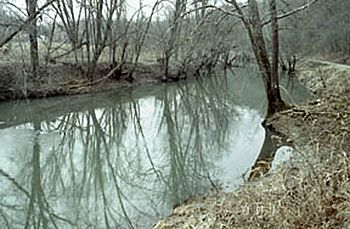Little Muskingum River facts for kids
Quick facts for kids Little Muskingum River |
|
|---|---|

The Little Muskingum River in the Wayne National Forest
|
|
| Country | United States |
| State | Ohio |
| Physical characteristics | |
| Main source | Monroe County, Ohio |
| River mouth | Ohio River near Reno, Ohio 582 ft (177 m) |
| Length | 65 mi (105 km) |
| Basin features | |
| Basin size | 315 sq mi (820 km2) |
The Little Muskingum River is a cool waterway in southeast Ohio, United States. It's about 65 miles (105 km) long and is a smaller branch, or "tributary," of the much larger Ohio River. Think of it as a smaller stream that eventually flows into a bigger river.
Contents
About the Little Muskingum River
This river flows through a beautiful, hilly part of Ohio. It's known for its winding path and the natural beauty along its banks. The Little Muskingum River is an important part of the local environment. It provides a home for many plants and animals.
Where Does the River Start?
The Little Muskingum River begins in the hills of Monroe County, Ohio. This is about 5 miles (8 km) northwest of the Ohio River. It's also about 8 miles (13 km) southeast of a town called Woodsfield.
The River's Journey
From its start, the river flows mostly southwest. It takes a very winding path, almost like a snake. It stays pretty close to the Ohio River, usually within 8 miles (13 km) of it. Along its journey, the Little Muskingum River passes by small towns like Rinard Mills and Dart.
Where the River Ends
Finally, the Little Muskingum River joins the Ohio River. This meeting point is about 5 miles (8 km) southeast of Marietta, Ohio. Interestingly, the Muskingum River (a much bigger river) also joins the Ohio River nearby, but from a different direction. Another stream called Duck Creek also flows into the Ohio River between these two points.
Through the National Forest
Almost the entire length of the Little Muskingum River flows through the Wayne National Forest. This means that most of the river is surrounded by protected forest land. Only the last 2 miles (3.2 km) of the river are outside of this forest. This helps keep the river and its surroundings wild and natural.
 | Janet Taylor Pickett |
 | Synthia Saint James |
 | Howardena Pindell |
 | Faith Ringgold |

